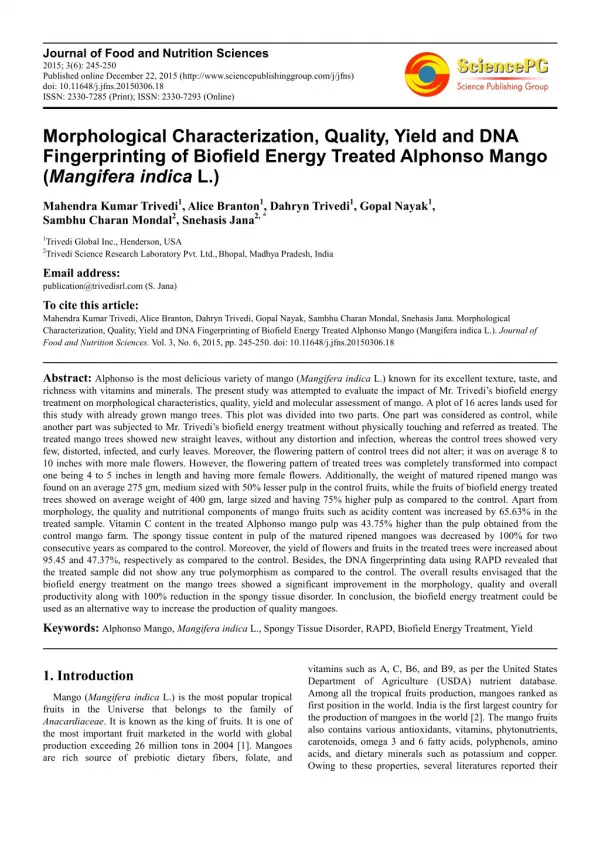Morphological Characterization, Quality, Yield and DNA Fingerprinting of Biofield Energy Treated Alphonso Mango (Mangife
Alphonso is the most delicious variety of mango (Mangifera indica L.) known for its excellent texture, taste, and richness with vitamins and minerals. The present study was attempted to evaluate the impact of Mr. Trivedi's biofield energy treatment on morphological characteristics, quality, yield and molecular assessment of mango. A plot of 16 acres lands used for this study with already grown mango trees. This plot was divided into two parts. One part was considered as control, while another part was subjected to Mr. Trivedi's biofield energy treatment without physically touching and referred as treated. The treated mango trees showed new straight leaves, without any distortion and infection, whereas the control trees showed very few, distorted, infected, and curly leaves. Moreover, the flowering pattern of control trees did not alter; it was on average 8 to 10 inches with more male flowers. However, the flowering pattern of treated trees was completely transformed into compact one being 4 to 5 inches in length and having more female flowers. Additionally, the weight of matured ripened mango was found on an average 275 gm, medium sized with 50% lesser pulp in the control fruits, while the fruits of biofield energy treated trees showed on average weight of 400 gm, large sized and having 75% higher pulp as compared to the control. Apart from morphology, the quality and nutritional components of mango fruits such as acidity content was increased by 65.63% in the treated sample. Vitamin C content in the treated Alphonso mango pulp was 43.75% higher than the pulp obtained from the control mango farm. The spongy tissue content in pulp of the matured ripened mangoes was decreased by 100% for two consecutive years as compared to the control. Moreover, the yield of flowers and fruits in the treated trees were increased about 95.45 and 47.37%, respectively as compared to the control. Besides, the DNA fingerprinting data using RAPD revealed that the treated sample did not show any true polymorphism as compared to the control. The overall results envisaged that the biofield energy treatment on the mango trees showed a significant improvement in the morphology, quality and overall productivity along with 100% reduction in the spongy tissue disorder. In conclusion, the biofield energy treatment could be used as an alternative way to increase the production of quality mangoes.
★
★
★
★
★
240 views • 6 slides









